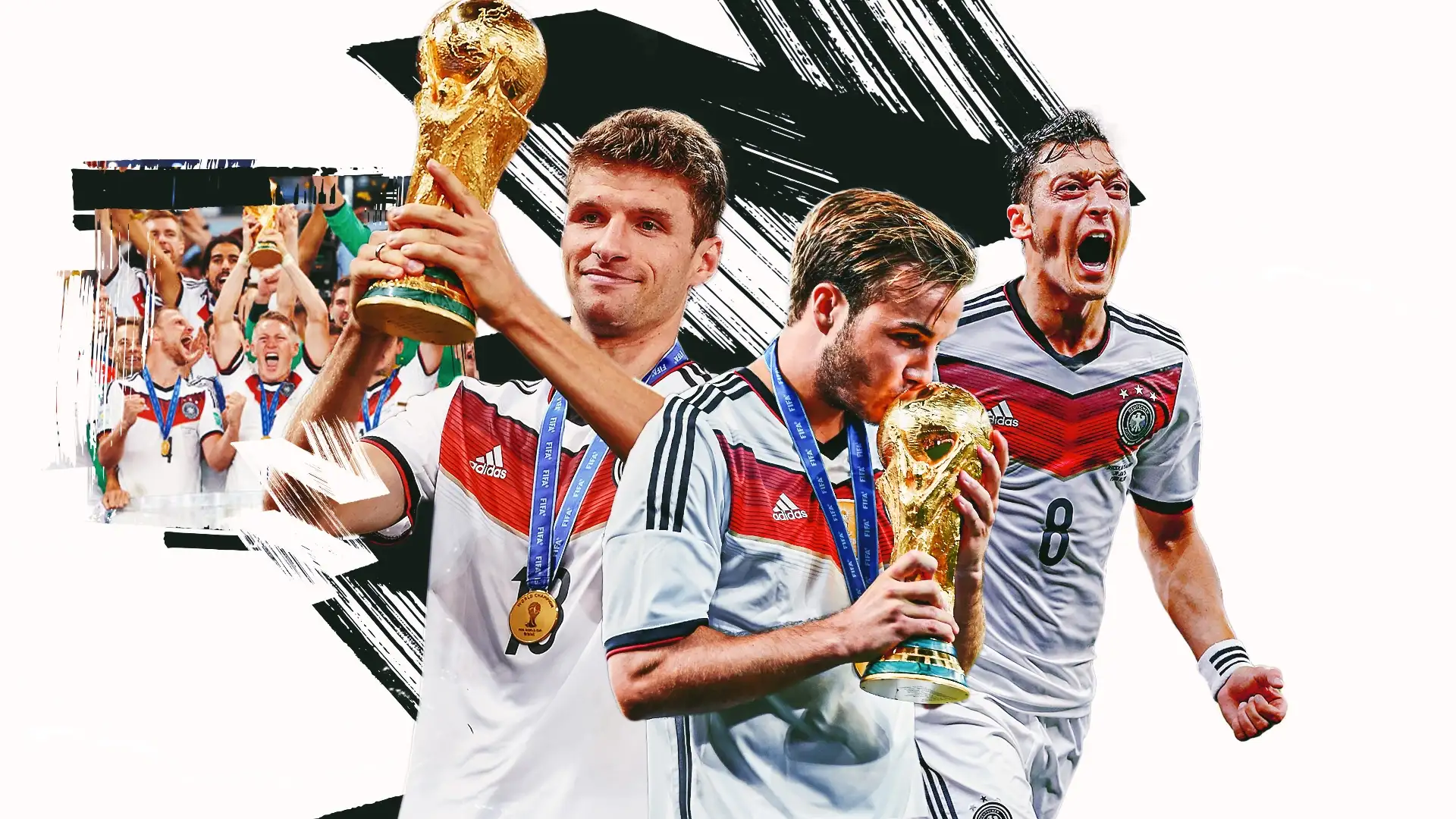Germany World Cup: A Legacy of Glory and Passion
Germany’s rich and illustrious history in the FIFA World Cup makes it one of the most celebrated football nations. From legendary players to unforgettable matches, Germany has consistently delivered world-class performances that have thrilled millions around the globe. This article explores Germany World Cup journey, highlighting its successes, challenges, and the qualities that have made it a footballing powerhouse.
A Legacy Built on Excellence
Germany’s involvement in the World Cup began in 1934, just four years after the tournament’s inception. Since then, the nation has participated in almost every edition, consistently performing at the highest level. With four World Cup titles (1954, 1974, 1990, and 2014), Germany ranks among the top football nations, rivaled only by Brazil, with five championships.
1954: The Miracle of Bern
Germany World Cup first victory in 1954, often referred to as “The Miracle of Bern,” is a moment that resonates deeply in the hearts of fans. Emerging from the devastation of World War II, the German national team, considered underdogs, managed to defeat the dominant Hungarian team 3-2 in the final. This victory not only brought joy to the nation but also marked the beginning of Germany’s footballing dominance on the global stage.
1974: Champions on Home Soil
Germany world cup In 1974, Germany hosted the World Cup and once again demonstrated its supremacy in football. Captained by the legendary Franz Beckenbauer, Germany faced off against the Netherlands, led by Johan Cruyff, in a thrilling final. Germany’s 2-1 victory solidified their place as a footballing powerhouse, and the image of Beckenbauer lifting the trophy in Munich remains iconic.
1990: Unity and Victory
The 1990 World Cup holds special significance, as it was won just before Germany’s reunification. The team, then known as West Germany, was again led by Franz Beckenbauer, this time as a manager. In a rematch of the 1986 final, Germany defeated Argentina 1-0, with Andreas Brehme scoring the decisive penalty. This victory symbolized unity, resilience, and strength during a critical period in the nation’s history.
2014: A New Era of Dominance
Germany’s most recent World Cup triumph in 2014 in Brazil is often regarded as one of the greatest team performances in World Cup history. With a mixture of youth and experience, the team, under manager Joachim Löw, played some of the most exciting and fluid football ever seen. The standout moment of the tournament was the 7-1 demolition of Brazil in the semifinals, a match that stunned the world. In the final, Mario Götze’s extra-time goal sealed a 1-0 victory over Argentina, giving Germany its fourth title.
German Football Philosophy: Precision, Efficiency, and Team Spirit
The German national team has always been synonymous with qualities such as precision, efficiency, and teamwork. These core principles have been the foundation of their success on the world stage.
Precision and Discipline
German football is characterized by an emphasis on structure, tactical discipline, and efficiency. From the grassroots level to the national team, players are trained to focus on technical excellence and positional play. This attention to detail has enabled Germany to consistently compete at the highest level, often overcoming more individually talented teams through superior organization and teamwork.
Teamwork Over Individualism
While other nations may boast iconic players, Germany’s success has always been rooted in its collective effort. Although stars like Gerd Müller, Miroslav Klose, and Lothar Matthäus have dazzled fans, the hallmark of the German team is its ability to function as a cohesive unit. This emphasis on unity is best exemplified by the 2014 World Cup team, where no single player dominated the headlines; instead, the entire squad contributed to the overall success.
Adaptability and Evolution
Another key factor in Germany World Cup success has been its ability to adapt and evolve with the times. From the defensive solidity of the 1950s and 1960s to the attacking flair of the 2014 team, Germany has always managed to stay ahead of tactical trends in world football. This willingness to innovate has allowed the nation to remain competitive, even as the game has changed drastically over the years.
The Future of Germany in the World Cup
As Germany looks to the future, the nation continues to invest heavily in youth development. With a robust academy system in place, the next generation of German talent is being groomed to carry on the legacy. Players like Joshua Kimmich, Jamal Musiala, and Kai Havertz represent the bright future of German football, and there is every reason to believe that more World Cup glory awaits in the years to come.
Germany’s commitment to nurturing young talent ensures that the team will remain competitive on the global stage for years to come. With a new generation of players already making their mark, there is a sense of optimism that Germany could soon add a fifth star to its crest.
Impact of Star Players on the Global Football Scene
The global football scene is heavily influenced by iconic players, and one of the most talked-about stars today is Kylian Mbappé. While the article primarily focuses on Germany, it’s impossible to overlook the influence of other world-class players like Mbappé, whose performances and potential moves between clubs have captivated football fans worldwide. For instance, many are curious about Kylian Mbappé’s Net Worth, a topic that reveals the immense value he brings to the game, both on and off the pitch. Moreover, ongoing speculations about Mbappé potentially joining Real Madrid continue to stir discussions, showcasing how individual brilliance shapes the dynamics of football across the globe.
FAQ: Frequently Asked Questions About Germany World Cup
How many times has Germany won the World Cup?
Germany has won the FIFA World Cup four times: in 1954, 1974, 1990, and 2014.
Who is Germany’s all-time top scorer in the World Cup?
Miroslav Klose is Germany’s all-time top scorer in the World Cup, with 16 goals. He also holds the record for the most goals scored in World Cup history.
What was Germany’s biggest World Cup victory?
Germany’s biggest World Cup victory came in the 2014 semifinal, where they defeated Brazil 7-1. This match is often referred to as one of the most shocking results in World Cup history.
Who is Germany’s most famous World Cup player?
Several players have achieved legendary status, but Franz Beckenbauer, Lothar Matthäus, and Miroslav Klose stand out as some of the most iconic German players in World Cup history.
Will Germany host the World Cup again?
While Germany hosted the World Cup in 1974 and 2006, there are no immediate plans for the nation to host another tournament. However, given its infrastructure and footballing tradition, Germany is always a strong candidate for future tournaments.
Conclusion: A Bright Future for Germany World Cup Journey
Germany World Cup legacy is one of resilience, excellence, and unity. With a commitment to youth development, tactical innovation, and teamwork, Germany remains a dominant force in international football. The passion and excitement surrounding the national team will undoubtedly continue as Germany looks forward to future tournaments, with the dream of adding more stars to its illustrious history.
Germany’s football story is a source of pride for the nation and a beacon of excellence for football fans around the world. Whether you’re a die-hard fan or new to the sport, Germany’s World Cup history is a thrilling journey filled with moments of joy, triumph, and an unbreakable spirit.
Be prepared for more magic, because the best of Germany is yet to come!




Post Comment